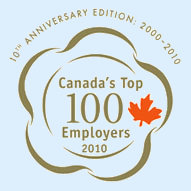Videoconferencing taking off
 It is more effective than teleconferencing, and less expensive than business travel. At a time when employers are offering their employees increasing flexibility, the growing success of videoconferencing in business is not due to chance! A recent Ipsos Reid poll found that 56% of Canadians use a webcam to stay connected with friends, family and colleagues. 79% of 1,035 respondents said that videoconferencing is more effective than teleconferencing, while 90% consider that using a webcam allows employees in different locations to feel they are on the same team.
It is more effective than teleconferencing, and less expensive than business travel. At a time when employers are offering their employees increasing flexibility, the growing success of videoconferencing in business is not due to chance! A recent Ipsos Reid poll found that 56% of Canadians use a webcam to stay connected with friends, family and colleagues. 79% of 1,035 respondents said that videoconferencing is more effective than teleconferencing, while 90% consider that using a webcam allows employees in different locations to feel they are on the same team.
Don’t work for free
The Commission des normes du travail du Québec has launched an online video inciting young workers and students to be more vigilant in their first jobs. The clip, titled Arrête de travailler gratis (stop working for free), uses humour to get through to its audience and remind them to check their pay stubs for salary and benefits, overtime, vacation pay, etc.
Watch the video (available in French with English subtitles)
Generation Y keeping a close eye on their online reputations
 According to a Pew Research Center poll poll of 2,000 Americans published in late May, people under 30 are very careful about their online reputations. Close to half of respondents had deleted unwanted comments about themselves, and a little over 40% said they had removed their names from photos tagged to identify them. Older people, on the other hand, were a little less wary—one third of 30–49-year olds and a quarter 50-64-year-olds had taken measures to limit access to their personal information.
According to a Pew Research Center poll poll of 2,000 Americans published in late May, people under 30 are very careful about their online reputations. Close to half of respondents had deleted unwanted comments about themselves, and a little over 40% said they had removed their names from photos tagged to identify them. Older people, on the other hand, were a little less wary—one third of 30–49-year olds and a quarter 50-64-year-olds had taken measures to limit access to their personal information.
The study shows that online reputation monitoring via search engines has increased, with about 60% of people of all ages having used search engines to find information about themselves online.
Top 50 Canadian employers for people under 40
 The editors of Canada’s Top Canadian Employers recently released their Canada's Top Employers for Young People 2010—a list of top employers for people under 40. Evaluation criteria included the methods used to attract and retain younger workers, including reimbursing tuition fees, mentoring, training programs, etc.
The editors of Canada’s Top Canadian Employers recently released their Canada's Top Employers for Young People 2010—a list of top employers for people under 40. Evaluation criteria included the methods used to attract and retain younger workers, including reimbursing tuition fees, mentoring, training programs, etc.
Consult the list of the 50 companies selected (alphabetical order)
Canadian companies too lax with absent employees
 According to a recent Conference Board of Canada study, Canadian companies are not doing enough about absenteeism, which has reached record levels. Of the 255 companies polled, 40% track the absenteeism rate, and only a fraction are concerned about the resulting costs. The study also revealed an average absenteeism rate of 6.6 days a year per full-time equivalent, which is higher than the rate in the U.S. (5.3 days) and the U.K. (5 days).
According to a recent Conference Board of Canada study, Canadian companies are not doing enough about absenteeism, which has reached record levels. Of the 255 companies polled, 40% track the absenteeism rate, and only a fraction are concerned about the resulting costs. The study also revealed an average absenteeism rate of 6.6 days a year per full-time equivalent, which is higher than the rate in the U.S. (5.3 days) and the U.K. (5 days).
Working too hard increases risk of heart disease
![]() According to a recent British study titled WhitehallII, people who regularly put in three to four hours of overtime, working 10 or 11 hours a day, had a 60% higher risk of heart disease, after accounting for known risk factors. The study was conducted on 6,014 British civil servants from 36 to 61 years of age. Researchers also found that employees who worked overtime had a very low absenteeism rate, and were less likely to consult a doctor when sick.
According to a recent British study titled WhitehallII, people who regularly put in three to four hours of overtime, working 10 or 11 hours a day, had a 60% higher risk of heart disease, after accounting for known risk factors. The study was conducted on 6,014 British civil servants from 36 to 61 years of age. Researchers also found that employees who worked overtime had a very low absenteeism rate, and were less likely to consult a doctor when sick.
Canadian workers see grass as greener on the other side
 Most Canadian workers think that they need to change companies to move up the ladder, according to the 2010 Towers Watson Global Workforce Study. The study, conducted with over 20,000 employees in 22 different markets between November 2009 and January 2010, revealed that Canadian respondents have a pessimistic view of the job market. Eight-eight per cent think that their career is stalled in their current company, and that they need to go to the competition to move up. Sixty per cent think that mentoring should be given more importance, while 59% would like better-defined career paths.
Most Canadian workers think that they need to change companies to move up the ladder, according to the 2010 Towers Watson Global Workforce Study. The study, conducted with over 20,000 employees in 22 different markets between November 2009 and January 2010, revealed that Canadian respondents have a pessimistic view of the job market. Eight-eight per cent think that their career is stalled in their current company, and that they need to go to the competition to move up. Sixty per cent think that mentoring should be given more importance, while 59% would like better-defined career paths.
Female CEOs fare better than men
 The 16 women CEOs heading companies in the Standard & Poor’s 500 Index earned an average of $14.2 million last year, or 43% more than their male counterparts, based on a Bloomberg study published in mid-May. Examples include Carol Bartz, Yahoo CEO since January 2009, who earned $47.2 million last year, and Irene Rosenfeld, Kraft Food CEO, who made $26.3 million. Another finding was that women who were already CEOs in 2008 got a 19% raise in 2009, while male CEOs took an average cut of 5%.
The 16 women CEOs heading companies in the Standard & Poor’s 500 Index earned an average of $14.2 million last year, or 43% more than their male counterparts, based on a Bloomberg study published in mid-May. Examples include Carol Bartz, Yahoo CEO since January 2009, who earned $47.2 million last year, and Irene Rosenfeld, Kraft Food CEO, who made $26.3 million. Another finding was that women who were already CEOs in 2008 got a 19% raise in 2009, while male CEOs took an average cut of 5%.
Situational interviews perceived to be fairer for hiring
 Companies that use situational interviews are perceived to have fairer hiring practices, according to a recent study by the Richard Ivey School of Business in Ontario. The study found fewer negative reactions to the hiring of visible minorities when used by companies with strong employment equity programs. The latter are often accused of encouraging reverse discrimination, as opposed to situational interviews, in which candidates are hired on the basis of merit.
Companies that use situational interviews are perceived to have fairer hiring practices, according to a recent study by the Richard Ivey School of Business in Ontario. The study found fewer negative reactions to the hiring of visible minorities when used by companies with strong employment equity programs. The latter are often accused of encouraging reverse discrimination, as opposed to situational interviews, in which candidates are hired on the basis of merit.